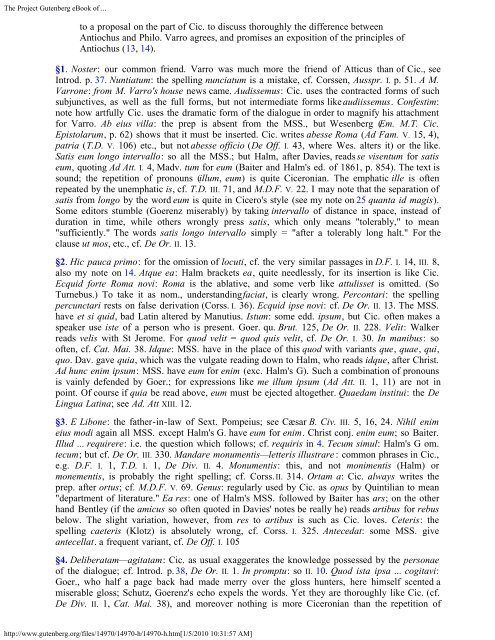academica of cicero. - 912 Freedom Library
academica of cicero. - 912 Freedom Library
academica of cicero. - 912 Freedom Library
You also want an ePaper? Increase the reach of your titles
YUMPU automatically turns print PDFs into web optimized ePapers that Google loves.
The Project Gutenberg eBook <strong>of</strong> ...<br />
to a proposal on the part <strong>of</strong> Cic. to discuss thoroughly the difference between<br />
Antiochus and Philo. Varro agrees, and promises an exposition <strong>of</strong> the principles <strong>of</strong><br />
Antiochus (13, 14).<br />
§1. Noster: our common friend. Varro was much more the friend <strong>of</strong> Atticus than <strong>of</strong> Cic., see<br />
Introd. p. 37. Nuntiatum: the spelling nunciatum is a mistake, cf. Corssen, Ausspr. I. p. 51. A M.<br />
Varrone: from M. Varro's house news came. Audissemus: Cic. uses the contracted forms <strong>of</strong> such<br />
subjunctives, as well as the full forms, but not intermediate forms like audiissemus. Confestim:<br />
note how artfully Cic. uses the dramatic form <strong>of</strong> the dialogue in order to magnify his attachment<br />
for Varro. Ab eius villa: the prep is absent from the MSS., but Wesenberg (Em. M.T. Cic.<br />
Epistolarum, p. 62) shows that it must be inserted. Cic. writes abesse Roma (Ad Fam. V. 15, 4),<br />
patria (T.D. V. 106) etc., but not abesse <strong>of</strong>ficio (De Off. I. 43, where Wes. alters it) or the like.<br />
Satis eum longo intervallo: so all the MSS.; but Halm, after Davies, reads se visentum for satis<br />
eum, quoting Ad Att. I. 4, Madv. tum for eum (Baiter and Halm's ed. <strong>of</strong> 1861, p. 854). The text is<br />
sound; the repetition <strong>of</strong> pronouns (illum, eum) is quite Ciceronian. The emphatic ille is <strong>of</strong>ten<br />
repeated by the unemphatic is, cf. T.D. III. 71, and M.D.F. V. 22. I may note that the separation <strong>of</strong><br />
satis from longo by the word eum is quite in Cicero's style (see my note on 25 quanta id magis).<br />
Some editors stumble (Goerenz miserably) by taking intervallo <strong>of</strong> distance in space, instead <strong>of</strong><br />
duration in time, while others wrongly press satis, which only means "tolerably," to mean<br />
"sufficiently." The words satis longo intervallo simply = "after a tolerably long halt." For the<br />
clause ut mos, etc., cf. De Or. II. 13.<br />
§2. Hic pauca primo: for the omission <strong>of</strong> locuti, cf. the very similar passages in D.F. I. 14, III. 8,<br />
also my note on 14. Atque ea: Halm brackets ea, quite needlessly, for its insertion is like Cic.<br />
Ecquid forte Roma novi: Roma is the ablative, and some verb like attulisset is omitted. (So<br />
Turnebus.) To take it as nom., understanding faciat, is clearly wrong. Percontari: the spelling<br />
percunctari rests on false derivation (Corss. I. 36). Ecquid ipse novi: cf. De Or. II. 13. The MSS.<br />
have et si quid, bad Latin altered by Manutius. Istum: some edd. ipsum, but Cic. <strong>of</strong>ten makes a<br />
speaker use iste <strong>of</strong> a person who is present. Goer. qu. Brut. 125, De Or. II. 228. Velit: Walker<br />
reads velis with St Jerome. For quod velit = quod quis velit, cf. De Or. I. 30. In manibus: so<br />
<strong>of</strong>ten, cf. Cat. Mai. 38. Idque: MSS. have in the place <strong>of</strong> this quod with variants que, quae, qui,<br />
quo. Dav. gave quia, which was the vulgate reading down to Halm, who reads idque, after Christ.<br />
Ad hunc enim ipsum: MSS. have eum for enim (exc. Halm's G). Such a combination <strong>of</strong> pronouns<br />
is vainly defended by Goer.; for expressions like me illum ipsum (Ad Att. II. 1, 11) are not in<br />
point. Of course if quia be read above, eum must be ejected altogether. Quaedam institui: the De<br />
Lingua Latina; see Ad. Att XIII. 12.<br />
§3. E Libone: the father-in-law <strong>of</strong> Sext. Pompeius; see Cæsar B. Civ. III. 5, 16, 24. Nihil enim<br />
eius modi again all MSS. except Halm's G. have eum for enim. Christ conj. enim eum; so Baiter.<br />
Illud ... requirere: i.e. the question which follows; cf. requiris in 4. Tecum simul: Halm's G om.<br />
tecum; but cf. De Or. III. 330. Mandare monumentis—letteris illustrare : common phrases in Cic.,<br />
e.g. D.F. I. 1, T.D. I. 1, De Div. II. 4. Monumentis: this, and not monimentis (Halm) or<br />
monementis, is probably the right spelling; cf. Corss. II. 314. Ortam a: Cic. always writes the<br />
prep. after ortus; cf. M.D.F. V. 69. Genus: regularly used by Cic. as opus by Quintilian to mean<br />
"department <strong>of</strong> literature." Ea res: one <strong>of</strong> Halm's MSS. followed by Baiter has ars; on the other<br />
hand Bentley (if the amicus so <strong>of</strong>ten quoted in Davies' notes be really he) reads artibus for rebus<br />
below. The slight variation, however, from res to artibus is such as Cic. loves. Ceteris: the<br />
spelling caeteris (Klotz) is absolutely wrong, cf. Corss. I. 325. Antecedat: some MSS. give<br />
antecellat. a frequent variant, cf. De Off. I. 105<br />
§4. Deliberatam—agitatam: Cic. as usual exaggerates the knowledge possessed by the personae<br />
<strong>of</strong> the dialogue; cf. Introd. p. 38, De Or. II. 1. In promptu: so II. 10. Quod ista ipsa ... cogitavi:<br />
Goer., who half a page back had made merry over the gloss hunters, here himself scented a<br />
miserable gloss; Schutz, Goerenz's echo expels the words. Yet they are thoroughly like Cic. (cf.<br />
De Div. II. 1, Cat. Mai. 38), and moreover nothing is more Ciceronian than the repetition <strong>of</strong><br />
http://www.gutenberg.org/files/14970/14970-h/14970-h.htm[1/5/2010 10:31:57 AM]















